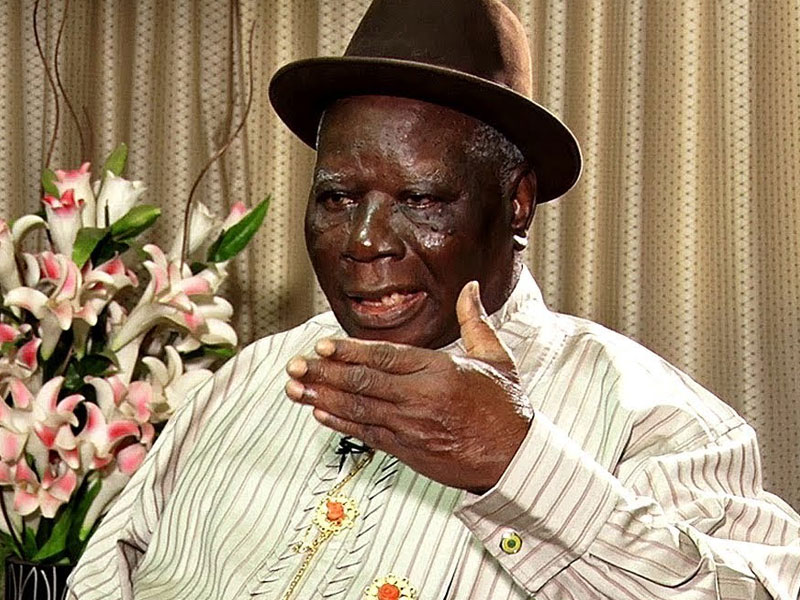
Elder Statesman, Chief Edwin Clark has urged President Bola Tinubu to declare a state of emergency on the deplorable state of roads in the oil-rich Niger Delta region of the country.
Clark, who made the appeal at a news conference in Abuja, on Tuesday, said the hope of addressing the decline in oil revenue accruing to the government would be a mirage if the infrastructure in the areas were not addressed.
The 96-year-old leader lamented that the country’s hope of revamping the national economy was being challenged with the unfortunate state of affairs in the South-South region.
He lamented the recent calamity in the region when 20 were burnt following an accident that occurred at Koko Junction on the Warri-Benin highway due to bad roads.
He said the dilapidated state of the road spoke volumes of the calamity which the people of the South-South region continue to face daily due to the most inhuman situation of the federal roads in the region.
The Ijaw National Leader noted with regret that despite the fact that the region produced the bulk of the wealth of the country, its impact was not being felt by his people.
He said, “We see the impact of the natural resource that is daily taken out of our soil here in the Federal Capital Territory, Abuja and almost every other part of the country, we are left to wallow in this total neglect, marginalisation and deprivation.”
He said the recent accident at the Koko junction could have been averted if the President Muhammadu Buhari government had made efforts to look into the state of the roads.
He said, “The East-West Road remains an ugly stain on Nigeria political administrative logic, especially for something considered as a signature project, because of its economic significance.
“No substantial inch of construction work has been added in the eight years of the Buhari Administration. Sections of the road supposedly constructed were washed away like whitewash on walls by the 2022 floods, obviously due to the poor standard of work done.
“As you would expect, that road is, right now, especially at the time of this 2023 rainy season, in total disrepair and a death trap where there is daily carnage.
“The connection between Calabar and Itu, that is, in the section between Cross River and Akwa Ibom remains one of the most dangerous roads in the world, even though the NNPC Ltd is supposed to have taken it over.
“Coming further down, under your government, you have gratefully awarded the section around the Refinery by Eleme Junction. For this, we are grateful.
“However, the connection between Rivers State and Bayelsa State has four major sections which collapsed due to the 2022 floods and has remained unrepaired, such that a normal journey that would have taken one and half hours between the two states now take three hours and more.
“If you continue to the axis between Patani and Warri, there are at least four major spots again where the road has totally collapsed and can no longer be passed.
“The commuters now have to go through bush paths in order to continue their journey.
“Between Warri and Sapele, there are so many bad spots, also washed away by floods and this continues from Sapele to Benin which led to the mammoth death in numbers at Koko junction.”
Speaking further, the elder statesman said: “If one may ask, what is the status of the $333 million Bodo-Bonny Road, a project expected to open up opportunities for rapid socio-economic development of the areas, even with a reported contribution of $167 million by the Nigeria Liquefied Natural Gas (LNG) Limited?
“Meanwhile, four years ago, the Minister of Works and Housing, Babatunde Fashola, while addressing the House of Representatives Committee on Works, disclosed that 524 road projects were ongoing in the six geopolitical zones of the country. Fashola said there were four multilateral-funded road projects, 81 under the Presidential Infrastructural Development Fund and 45 others being funded under the Sukuk bond.
“Certainly, billions of naira, from the Niger Delta oil and gas resources have been approved and expended on the construction and rehabilitation of roads and bridges across the country, excluding roads and bridges in the South-South zone.”
Clark said some of the roads and bridges reportedly completed or being constructed/reconstructed, among others, included the Kano-Maiduguri Road linking Kano-Jigawa-Bauchi-Yobe and Borno States Section II, covering over 177km.
He added, “From the information that was made available, in terms of kilometres (length of the roads), the South-South had the least with only 52.2 kilometres.
“The North Central had 1,479.9 kilometres; North West had; North East had; South-East had 122 kilometres and South-West had 119 kilometres.
“What were the reasons for such an absurd distribution? What was the yardstick? He queried.
He also alleged that the then Minister of Works and Housing, Fashola, neglected the South-South zone in the allocation and distribution of projects by his ministry, “in tandem with the established pattern of the Buhari administration.”
“Even the housing units being built by the federal government across the country, we are unaware of any being built in the south-south,” he added
He said, “Recall that when the $311 million Abacha loot was returned from the United States in 2020, the South-South was excluded in projects designated for the fund, which included the second Niger Bridge, Lagos-Ibadan and Abuja-Kaduna-Kano expressways, as well as the Mambilla Power Project in North East zone; no project in the South-South zone was listed. That scenario was repeated with the Ibori loot.”

